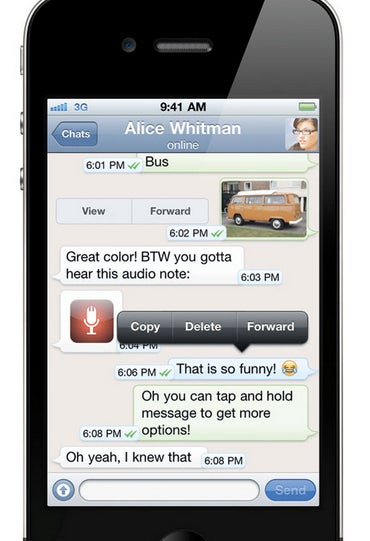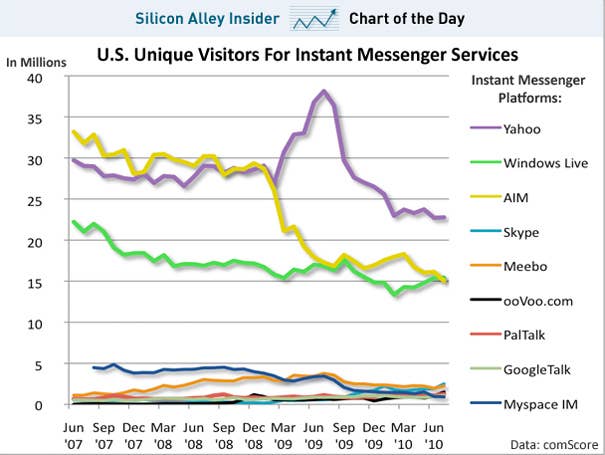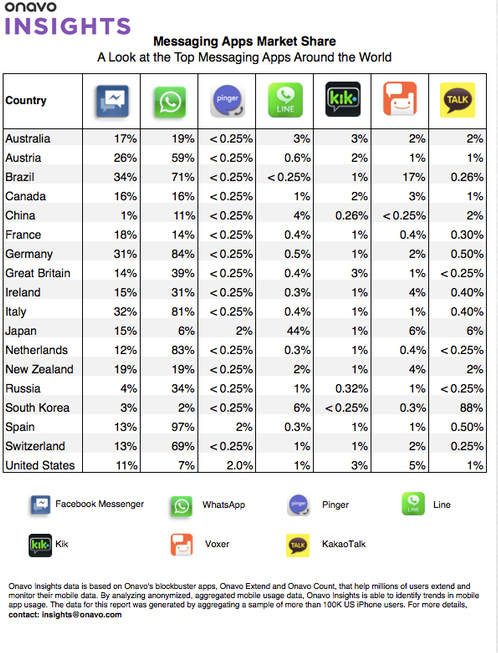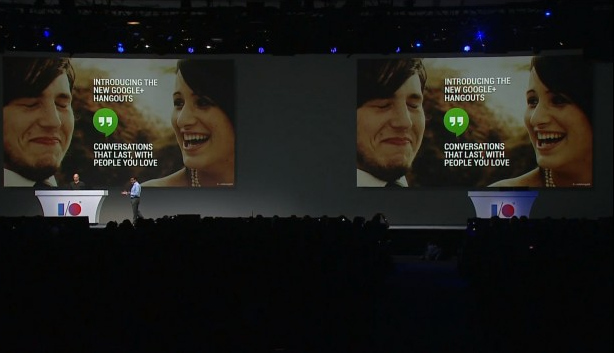


If you strip away the flashy interfaces, expensive ad campaigns, and layers of hype, you'll notice that for the past 15 years, the dominant unit of social technology has remained virtually unchanged: Today, as was the case in the '90s, instant messaging is still king.
Messaging's raw ability to connect users, going back as far as ICQ and AIM, has made it a kingmaker of sorts. Provide the best messaging experience and the users will come in droves. In the late '90s and early 2000s, boosted by AOL's subscription service, AIM not only created a successful product, but one of the earliest large-scale social networks, complete with meticulously kept user profiles and a simple but unique culture.
And yet, historically, winning the messaging game has also been a curse. In 2006, Neilsen data showed AOL had a commanding lead over MSN in instant messaging with 52% market share and over 53 million users. By mid-2009, the number fell to below 20 million users, and by 2010 AIM was thought to be all but dead, its users stolen away by web-based email and social networks, which had their own robust messaging platforms. Desktop clients like AIM and Yahoo Messenger could only watch as their failure to adapt to a social, web-based internet caused them to hemmorage users.

Today, the cycle is positioned to repeat itself. The threat, this time, comes from the mobile world, with over-the-top (OTT) messaging progams like WhatsApp, Line, Kik, and WeChat all on the rise. Combined, these mobile messagers are approaching 1 billion users. WhatsApp, the leader of the bunch, boasted 18 billion messages a day in January — a figure that is almost certainly higher today. According to one Informa report, OTT apps, which allow users to sidestep wireless carrier texting fees, have surpassed SMS as the primary mode of mobile communication, with a staggering 41 billion OTT messages sent per day. Just as desktop messaging apps gave way to web-based chat, web-based chat may be giving way to smartphone apps.
"I've seen data from companies that do device and behavioral analysis, and the figures are jaw-dropping," Forrester research analyst Charles Golvin told BuzzFeed. "In places like Brazil, Mexico, Spain, and a number of other markets you see extraordinary numbers. Twenty-five percent of the time people spend on smartphones, they're spending in WhatsApp. The number is variable for each of those countries, but it is of that magnitude."
While the rise of the WhatsApps has rankled wireless carriers, it could also have a profound effect on social networks and messaging giants like Facebook and Google, which are finding themselves flat-footed and playing catch-up in an increasingly mobile, message-centric world. A chart published in January by Onavo insights shows that, especially internationally, OTT apps have taken a substantial bite out of Facebook's messaging user base across iOS.

While Facebook and Google are dominant companies with huge pools of devoted users, it's not hard to imagine one or both companies falling victim to the messaging curse. And both employ people to do just that — and to figure out how to prevent it.
"It's the classic innovator's dilemma," Google's director of real-time communications Nikhyl Singhal said. "And it's been a real challenge for us. As you get people using your product at scale, you spend a lot of time trying to service those users and the existing product. Then you are dealing with these smaller hyper-growth companies and you realize if you can just take a step back and build out their capabilities, it will help your users, but now you're looking at start-ups moving quicker than you and you have to think, how do we take this user base and give them the capabilities they'll need, but also enough of the enterprise abilities so that they don't abandon the product?"
Singhal and Google have been upfront about the company's challenging position in the mobile messaging world. Last year at Google I/O Singhal shocked conference-goers with an unusual confession, noting, "I think we've done an incredibly poor job of servicing our users here." At this year's I/O, Google unveiled its Hangout app, which is the company's attempt to consolidate all its communications products in one mobile-centric place. For Google, Hangouts is as much a triumph of design as it is an acknowledgment that mobile messaging is too important a market to lose.

But it may already be too late for the web-based giants. "Looking at the trend, you'd have to say the odds are against companies like Facebook and that this is WhatsApp's game to lose," messaging app Just.me founder Keith Teare told BuzzFeed. "WhatsApp is laser-focused on a very specific user base and may not have the vision to build a product that contains what a future user might want, but Facebook and Google have serious legacy issues as they're built for the web. Not that they couldn't make the change, but it's a huge switch to make."
Singhal notes that, at least for Google, there are many variables at play. "We can only control our product," he told BuzzFeed. "We have a strong point of view that if we create a strong, clean experience, which we think we've built with Hangouts, we will see users excited about what we do. Does that mean they'll stop using other products? I'm not sure, but we're happy to be in the game. Beyond that, it's an interesting battle to see which app users will gravitate toward."
"We can't control that," he said, "but we're pretty heavily interested in investing in this product."
